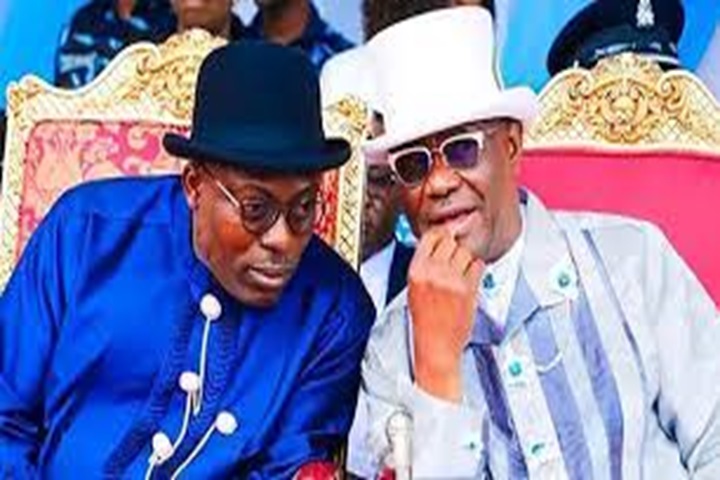The Minister of the Federal Capital Territory (FCT), Nyesom Wike, has made a firm declaration that he will no longer support the political ambitions of Rivers State Governor, Siminalayi Fubara.
This vow comes amidst a growing political rift between the two, stemming from allegations of dishonesty and betrayal.
In a recent interview on Politics Today, aired on Channels Television, Wike publicly voiced his disappointment with Fubara, accusing the governor of fabricating lies about him in a bid to tarnish his reputation.

During the interview, Wike expressed deep frustration over claims made by Governor Fubara that Wike had asked him for large sums of money—N20 billion and N100 billion respectively.
Wike categorically denied these accusations and vowed never to lend his political support to Fubara again. When asked whether he would back Fubara in the 2027 gubernatorial elections, Wike’s response was unequivocal: “I will never support Fubara in my political life again.”
Wike, who played a pivotal role in Fubara’s rise to power, accused the governor of being ungrateful, stressing that Fubara’s current position was due to the hard work and sacrifices made by others, including himself.
“He wouldn’t have even taken the 5th position,” Wike asserted, referring to the fierce competition for the governorship. He continued by stating that he had personally intervened and spoken to various stakeholders to secure Fubara’s victory, only for Fubara to turn against him with baseless allegations.
One of the most significant grievances Wike aired was his belief that Fubara had deliberately misrepresented him in the public eye. Wike said, “He turned it that I am asking for N20 billion, N100 billion.
He turned up lies against me.” This sense of betrayal has clearly left a lasting mark on Wike, who emphasised his role in grooming Fubara for leadership. Wike reminded the audience that he had been instrumental in “bringing him up, putting him there, and pushing him there,” alluding to the governor’s indebtedness to him.
However, Wike noted that Fubara’s recent actions were a clear indication that the relationship had soured beyond repair.
Wike’s fallout with Fubara appears to go beyond personal grievances, touching on broader issues of governance and respect for the rule of law. According to Wike, the governor had taken advantage of a sensitive political period to further his own agenda, all the while disrespecting key figures, including himself.
“The governor took advantage of the presidential intervention to insult everybody,” Wike claimed, noting that his own position as an appointee of President Bola Tinubu should not have been an excuse for such behaviour.
Wike also pointed out that he had supported Tinubu’s presidential bid out of a belief in the principles of equity, fairness, and justice. He stressed that his backing of Tinubu was not based on any personal gain or agreement.
“I never had any bargain before I supported Mr President,” Wike stated, adding that his support was driven by a conviction in Tinubu’s leadership abilities rather than any promise of personal benefit. This clarification came in response to speculation that his appointment as FCT Minister was a reward for his earlier support.
Wike’s critique of Fubara extended to the governor’s apparent disregard for the rule of law. Wike cited an instance where the president had requested Fubara to resubmit his budget, a request the governor allegedly ignored.
According to Wike, Fubara instead encouraged people to pursue legal challenges. “The president said, ‘re-submit your budget,’ and he refused,” Wike explained, highlighting the governor’s defiance.
Wike went on to express disbelief at the governor’s actions, noting that such behaviour was not only disrespectful to the office of the president but also an affront to democratic principles.
For Wike, Fubara’s refusal to comply with the president’s request was indicative of a broader tendency towards impunity. He questioned why anyone would support a leader who openly flouted the rules and disrespected established processes.
“Why would I support a man who didn’t obey the rule of law? Why will I support impunity?” Wike asked rhetorically, reinforcing his stance that his political relationship with Fubara was irreparable.
The fallout between Wike and Fubara signals the end of what was once a strong political alliance. Wike’s public denunciation of Fubara has made it clear that any hopes of reconciliation are unlikely. As Wike himself put it, “I will never do that, and everybody knows me.”
His words suggest that his decision to cut ties with Fubara is final, a significant development given Wike’s influence in Rivers State politics.
This public rift may have far-reaching consequences for both men’s political futures. For Fubara, losing Wike’s support could complicate his bid for re-election in 2027, especially given Wike’s considerable clout in the region.
On the other hand, Wike’s reputation as a kingmaker in Rivers State may suffer if this dispute escalates further, potentially alienating some of his political allies. However, if his past statements are anything to go by, Wike appears unconcerned with these risks, prioritising his principles over political expediency.
In conclusion, the clash between Nyesom Wike and Siminalayi Fubara represents more than just a personal feud; it is a reflection of deeper issues within Nigerian politics, including loyalty, governance, and respect for the rule of law.
As both men move forward, the question remains whether this rift will reshape the political landscape in Rivers State and beyond.
Support InfoStride News' Credible Journalism: Only credible journalism can guarantee a fair, accountable and transparent society, including democracy and government. It involves a lot of efforts and money. We need your support. Click here to Donate
